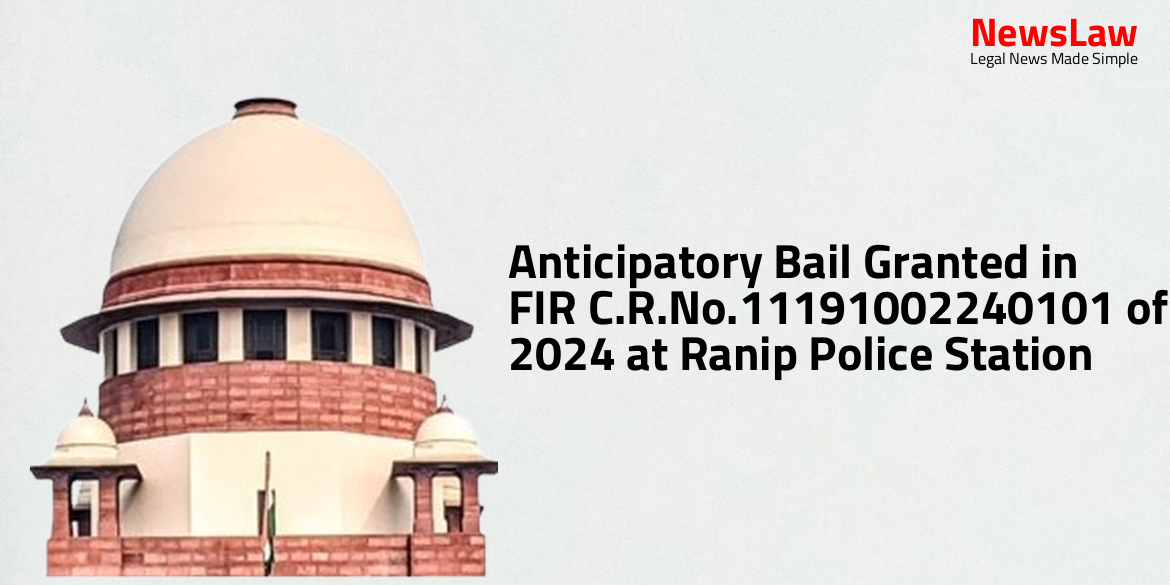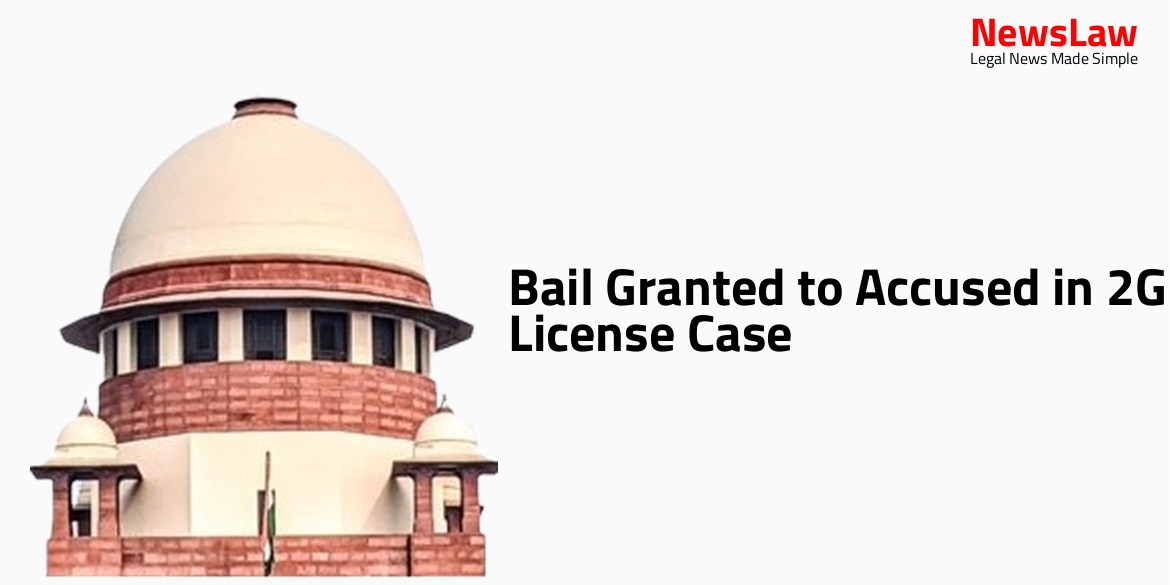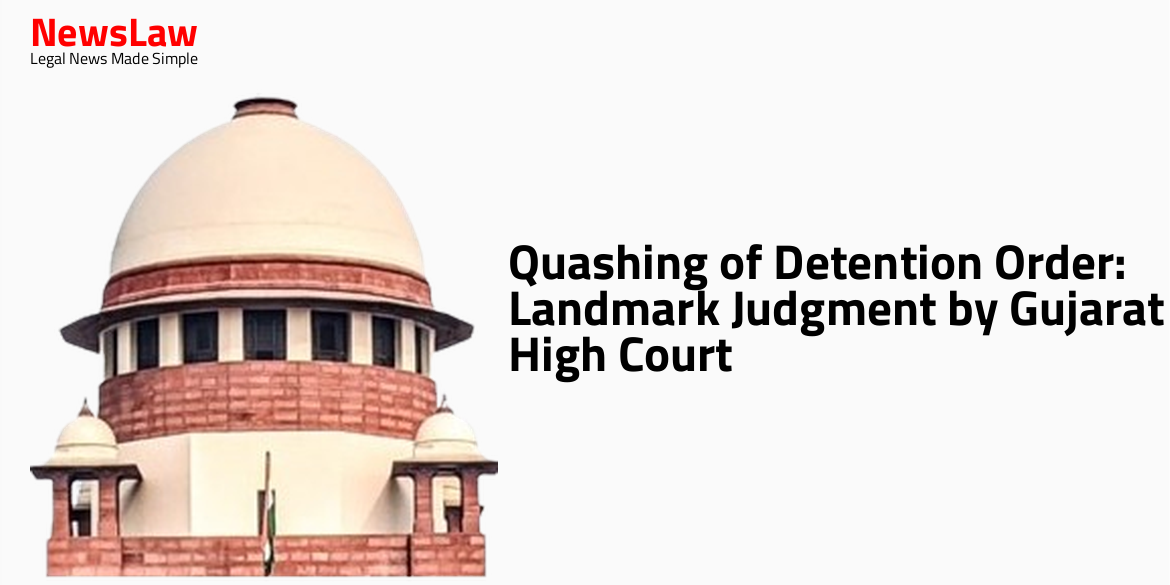In a significant ruling by the Gujarat High Court, a detention order under the Gujarat Prevention of Anti-Social Activities Act was quashed, upholding constitutional principles and individual freedoms. The case involved a challenge against the detention order passed on 19.01.2024, with the court emphasizing the distinction between law and order versus public order disturbances, as established in previous landmark judgments.
Facts
- Petition challenged the detention order under the Gujarat Prevention of Anti-Social Activities Act, 1985.
- The detaining authority passed the order on 19.01.2024 under Section 3(1) of the Act.
- The petitioner is detained as per the definition under Section 2(c) of the Act.
Issue
- The issue in this case involves determining whether the actions of the Petitioner (Original Name) are in violation of Article XYZ of the Constitution of India.
- The Petitioner argues that their actions are constitutionally valid and protected under Article XYZ.
- On the other hand, the Respondent (Original Name) contends that the actions of the Petitioner contravene the provisions of Article XYZ and are unconstitutional.
- The court must now interpret the relevant constitutional provisions and determine whether the Petitioner’s actions can be deemed as a substantial question of law in relation to the Constitution of India.
Arguments
- The petitioner’s advocate argues that the order of detention should be quashed and set aside as it was solely based on the registration of two FIRs for specific offenses, which do not relate to public order.
- It is contended that the alleged illegal activities do not have any connection to public order, but rather constitute a breach of law and order.
- The lack of substantial evidence beyond witness statements and FIR registrations is highlighted to show that the petitioner’s activities do not disturb public order.
- The advocate argues that the criminal cases against the petitioner, for which they are out on bail, do not demonstrate a threat to public order.
- The detaining authority’s decision is challenged as not being legally sound, given that the offenses alleged in the FIRs do not impact public order as required by the law.
- The advocate asserts that the existing penal laws are sufficient to address the situation without resorting to detention under the specific Act.
- It is emphasized that unless there is concrete evidence of the petitioner posing a threat to society and public order, the detention is unjustified.
- Case laws from the Apex Court are cited to support the argument that the petitioner’s actions do not meet the criteria for detention under the Act.
- The lack of specific material indicating the petitioner’s actions as a danger to public order is underlined, beyond general statements.
Analysis
- The distinction between disturbance to ‘law and order’ and disturbance to ‘public order’ has been settled by a Constitution Bench in the case of Dr. Ram Manohar Lohia vs. State of Bihar, reported in AIR 1966 SC 740.
- Every disorder does not meet the threshold of disturbance to public order unless it affects the community at large.
- Detention under Rule 30 of the Defence of India Rules permits apprehension and detention of a person likely to act in a manner prejudicial to the maintenance of public order.
- Routine and unjustified use of Preventive Detention Law was observed in the case of Mallada K. Sri Ram vs The State of Telangana & Ors. 2022 6 SCALE 50.
- The Apex Court has cautioned against detaining individuals solely for disturbing law and order, distinguishing it from disturbing public order.
- Apprehension of an adverse impact on public order must be based on concrete evidence and reports of unrest, not mere surmise.
- Preventive detention powers must be exercised cautiously, respecting lawful standards and ensuring no arbitrary deprivation of personal liberties.
- The Apex Court emphasized that preventive detention is not a substitute for ordinary criminal law and should not be used to keep individuals in perpetual custody without trial.
- The freedom of individuals is supreme, and detention should only be imposed when extremely necessary and when activities affect public order, mindful of Articles 21 and 22 of the Constitution of India.
- The District Magistrate was perceived as overstepping his authority by adding a clause to the Defence of India Rules.
- The concept of law and order, public order, and security of the State were represented as three concentric circles, with law and order being the largest circle.
- Though the alleged offenses by the Appellant could be penalized under the Andhra Pradesh Prohibition Act, the use of preventive detention laws was deemed unnecessary.
- The severity of the accusations against the detainee was acknowledged, yet the misuse of preventive detention powers was evident by the numerous invalid detention orders under the Telangana Act of 1986.
- Lack of reference to a bail cancellation application by the State added to the flawed nature of the detention order.
- The extraordinary and potentially harsh nature of preventive detention powers was highlighted in this case.
- The judgment pointed out a lack of proper evaluation of circumstances impacting the subjective satisfaction of the detaining authority.
- The two FIRs against the detenu were deemed manageable through regular criminal law procedures, not requiring preventive detention measures.
- A District Magistrate’s jurisdiction to prevent public order subversion was emphasized, excluding actions related to maintaining law and order in normal situations.
- Personal liberty protected under Article 21 is sacrosanct and high in constitutional values.
- The detaining authority must show that the impugned detention aligns with the established procedure.
- Registration of FIRs alone does not indicate a breach of public order under the Act.
- No relevant and cogent material exists to invoke power under Section 3(1) of the Act.
- The petition is allowed, and the detention order dated 19.01.2024 is quashed and set aside.
Decision
- Rule made absolute to the extent mentioned.
- Petitioner – detenue to be released immediately if not needed in another case.
- Direct service permitted.
Case Title: SUNIL @ NITIN SHIVMANGALSING BHADORIYA(RAJPUT) THROUGH SUNNY SHIVMANGALSING BHADORIYA(RAJPUT) Vs. STATE OF GUJARAT
Case Number: R/SCA/3209/2024



